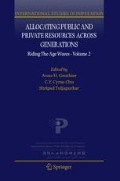Most existing literature on intergenerational transfers in the West focuses on downward transfers from parents to children. Two strands of studies have been developed in the past decade. One strand emphasizes inter vivos transfers while the other strand looks at postmortem bequests.
As described in various sources, in oriental societies child-to-parent transfers may be more essential than that from parent to child. The Taiwan Elderly Survey conducted in 2000 shows that more than 47 percent of the elderly rely on financial support from their children to sustain their living. Another island-wide survey entitled Panel Study of Family Dynamics (PSFD) shows a similar pattern. Among interviewees (aged 36–65) surveyed in 1999-2000 by PSFD, 53 percent reported that they provided financial transfers to their parents regularly, while only less than 5 percent received financial transfers from their parents.
Access this chapter
Tax calculation will be finalised at checkout
Purchases are for personal use only
Preview
Unable to display preview. Download preview PDF.
References
Altonji, J.G., Hayashi, F. and Kotlikoff, L.J. (1997), “Parental altruism and inter vivos transfers: Theory and evidence.” Journal of Political Economy, 105:1121–1166.
Becker, G.S. (1974), “A Theory of social interactions.” Journal of Political Economy, 82:1063–1093.
Bernheim, B.D., Shleifer, A. and Summers, L.H. (1985), “The strategic bequest motive.” Journal of Political Economy, 93:1045–1076.
Bott, E. (1968), Family and Social Network: Roles, Norms and External Relationships in Ordinary Families. Tavistock Publications: London.
Chan, C.-N. (1990), Families and Society. Linking Publications (in Chinese): Taipei.
Cox, D. (1987), “Motives for private income transfers.” Journal of Political Economy, 95:508–546.
Cox,D., Eser, Z. and Jimenez, E. (1998), “Motives for private transfers over the life cycle: An analytical framework and evidence for Peru.” Journal of Development Economics, 55:57–80.
Freeman, R., Thornton, A. and Yang, L.-S. (1994), “Determinants of coresidence in extended households.” In: Social Changes and the Family in Taiwan, A. Thornton and H.-S. Lin, eds. University of Chicago Press: Chicago.
Kandel, E. and Lazear, E.P. (1992), “Peer pressure and partnership.” Journal of Political Economy, 100:801–817.
Kotlikof, L.J. and Spivak, A. (1981), “The family as an incomplete annuities market.” Journal of Political Economy, 89:372–391.
Laitner, J. (1997), “Intergenerational and intrahousehold economic links.” In: Handbook of Population and Family Economics, Vol. 1, A. M. R. Rosenzweig and O. Stark, eds. North-Holland: Amsterdam.
Lindbeck, A. (1997) “Incentives and social norms in household behavior.” American Economic Review, 87:370–377.
Lindbeck, A., Nyberg, S. andWeibull, J.W. (1999), “Social norms and economic incentives in the welfare state.” Quarterly Journal of Economics, 114:1–35.
Perozek, M.G. (1998), “A reexamination of the strategic bequest motive.” Journal of Political Economy, 106:423–445.
Rivers, D. and Vuong, Q.H. (1988), “Limited information estimators and exogeneity tests for simultaneous probit models.” Journal of Econometrics, 39:347–366.
Sung, L.-S. (1974), Inheritance and Kinship in North Taiwan. Ph.D. dissertation, Department of Anthropology, Stanford University.
Vella, F. (1993), “A simple estimator for simultaneous models with censored endogenous regressors.” International Economic Review, 34:441–457.
Weinstein, M., Sun, T.-H., Chang, M.-C. and Freedman, R. (1990), “Household composition, extended kinship, and reproduction in Taiwan: 1965–1985.” Population Studies, 44:217–239.
Weinstein, M., Sun, T.-H., Chang, M.-C. and Freedman, R. (1994), “Co-residence and other ties linking couples and their parents.” In: Social Changes and the Family in Taiwan, A. Thornton and H.-S. Lin, eds. University of Chicago Press: Chicago.
Wilhelm, M.O. (1996), “Bequest behavior and the effect of heirs’ earnings: Testing the altruistic model of bequests.” American Economic Review, 86:874–892.
Wellman, B. (1990), “The place of kinfolk in personal community networks.” Marriage and Family Review, 15:195–228.
Yeh, K.-H. (1994), “Living arrangement of elderly parents in Taiwan: A psychological perspective.” Bulletin of the Institute of Ethnology, Academia Sinica, 83:121–168 (in Chinese).
Author information
Authors and Affiliations
Editor information
Editors and Affiliations
Rights and permissions
Copyright information
© 2007 Springer
About this chapter
Cite this chapter
Chu, C.Y.C., Yu, RR. (2007). Kinship Networks and Intergenerational Transfers. In: Gauthier, A.H., Chu, C.Y.C., Tuljapurkar, S. (eds) Allocating Public and Private Resources across Generations. International Studies In Population, vol 3. Springer, Dordrecht. https://doi.org/10.1007/978-1-4020-4481-6_2
Download citation
DOI: https://doi.org/10.1007/978-1-4020-4481-6_2
Publisher Name: Springer, Dordrecht
Print ISBN: 978-1-4020-4480-9
Online ISBN: 978-1-4020-4481-6
eBook Packages: Humanities, Social Sciences and LawSocial Sciences (R0)

